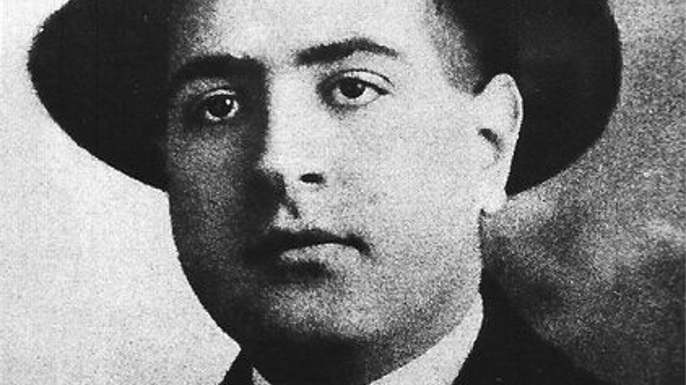
FALSE STATUE
Only in false gold have my eyes shimmered;
I’m a sphynx without mystery at sight.
The sadness of things that never happened
descend in my soul as a veiled light.
In my pain, craving swords are broken,
illuminated arrows blend with dark.
The shades flowing from me are torn apart,
as with yesterday, to me, today is forsaken.
I quiver no longer in face of secrecy;
Nothing torments me, not even gore:
Life flows through me like a war,
Without a single breath of fear!
I’m a drunken star who lost its skies,
a maddened mermaid who left the sea;
A godless temple crumbling to its lies,
A false statue still held highly.
Mário de Sá-Carneiro, Paris, 5 of May of 1913
MERCEDES IN HER FLIGHT
A gelid and upright guitar
is what you are in rocks of height.
A throatless voice, a dark voice sounding
everything without sounding anything.
Your thoughts are snow slipped
by the infinite glory of whiteness.
Your profile a perennial burn,
your heart a freed dove.
Sing, sing in the freedom of air,
that fragrant dawning melody,
mound of light and wound of lily.
So that we, down here, day and night
shall make in the corners of sadness
a garland of melancholy.
Federico García Lorca
55, Rain Passage
«In each raindrop my failed life cries within nature. There is something in my drop-by-drop disquiet, in the downpour-to-downpour with which the sadness of a day unbecomes uselessly over the earth.
It rains heavily, so heavily. My soul is humid just by hearing it. So heavily… My flesh is liquid and aqueous wrapping around my sensation of it.
A restless cold places those frigid hands around my poor heart. The grey hours stretch out, flatten themselves upon time; the moments drag out.
How it rains!
The gutters spit out scant torrents of water always suddenly. Slithers through my knowledge that there are pipes with an unsettling noise of down-spurt. Rain bangs against the glass, indolent, moaning.
A cold hand grips my throat and impedes me from breathing life.
Everything dies within me, even the knowledge that I can dream! In no physical sense am I fine. Every softness in which I recline has edges for my soul. All eyes I look upon are so dim after this indigent daylight breaks onto them so it can die without pain.»
Fernando Pessoa (through Bernardo Soares), 1914(?) in Book of Disquiet
156
«What imprecise queen holds near her lakes the memory of my broken life? I was the pageboy of promenades too insufficient to the aerial hours of my blue stillness. Distant ships completed the sea by waving over my terraces, and in southern clouds I lost my soul, like a dropped paddle.»
Fernando Pessoa (through Bernardo Soares), 1918(?), in Book of Disquiet
João-Maria

These are wonderful choices to have shared. I’m familiar with Lorca, not the others. I’ll have to read some more of their poetry. Thank you for the introduction.
LikeLiked by 1 person
Lorca is quite famous in international circles; Portuguese authors, especially outside of Pessoa, are hardly known. I do have the volition to bring them forth but my primitive translation skills often make me hesitant to do so. Thank you dearly for reading and your stapling and endearing comments.
LikeLiked by 1 person
I so enjoyed these! Thank you for sharing!
LikeLiked by 1 person
My pleasure!
LikeLiked by 1 person
So many feelings, so many thoughts ! Thank you!!
LikeLiked by 1 person
Thank *you* for reading them!
LikeLiked by 1 person
A pointed collection on melancholia – “only in false gold have my eyes shimmered,” “I lost my soul, like a dropped paddle.” One could almost read them as one interconnected poem in three voices. Where does melancholy lead us when we realize the falseness of things that have been our food and drink and see that the central truth of ourselves drifts lost somewhere behind us, like a dropped paddle?
LikeLiked by 1 person
Not only melancholy, but that refined conceptual space Pessoa introduced with his modernist heteronyms, that of negative nostalgia; to understand so vividly the nature of our perpetual loss and how the circularity of that mourning thrashes and twists our days, a laden cumulative moroseness that widens itself like a cancer merely because our past state of brightness seems ever so dim and distant.
These problems have spun some of my most favoured Art, but, one must be wary as to not enchant them with much weight; Art needs sadness, but to coalesce them completely may seem like an exercise of slow death.
LikeLike
Well said and intriguing how such a nostalgia cumulative in its moroseness and cancerous can yet deftly by the poet be given lightness of being so that the rasa, the taste of the words, still pleases or somehow feeds us instead of emptying us. How I wish I had lifetimes to immerse myself in the words of the Iberian and Latin American poets!
LikeLiked by 1 person